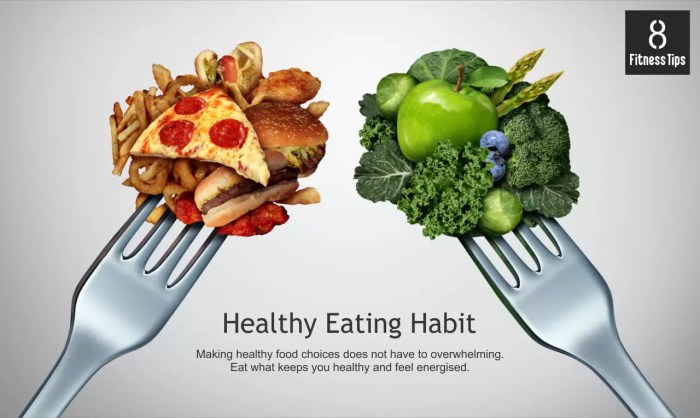Kicking off with Healthy Eating Habits, this topic is all about maintaining a balanced diet with style and flair. Get ready to dive into the world of nutritious foods, meal plans, and overcoming challenges to stay on track.
Benefits of Healthy Eating Habits
Maintaining healthy eating habits comes with a plethora of benefits that positively impact both our physical and mental well-being. A balanced diet not only fuels our bodies but also nourishes our minds, contributing to an overall sense of wellness.
Physical Benefits
- Improved energy levels: Consuming nutritious foods provides our bodies with the necessary nutrients to function optimally, leading to increased energy levels throughout the day.
- Weight management: Healthy eating habits help regulate weight, reducing the risk of obesity and related health issues such as diabetes and heart disease.
- Stronger immune system: A diet rich in fruits, vegetables, and whole grains boosts immunity, making our bodies more resilient to illnesses.
Mental Health Advantages
- Enhanced mood: Nutrient-dense foods can positively impact our mood and mental health, reducing the risk of conditions like depression and anxiety.
- Improved cognitive function: A balanced diet supports brain health, enhancing cognitive function, memory, and focus.
- Reduced stress levels: Certain foods, such as those rich in omega-3 fatty acids, can help lower stress levels and improve overall mental well-being.
Overall Well-Being
- Longevity: Healthy eating habits have been linked to increased longevity and a lower risk of chronic diseases, allowing individuals to lead longer, healthier lives.
- Better sleep quality: Consuming a balanced diet can improve sleep quality, leading to enhanced rest and overall well-being.
- Improved quality of life: By prioritizing nutrition and healthy eating, individuals can experience an overall improvement in their quality of life, enjoying better health and vitality.
Building Healthy Eating Habits

Eating healthy is not just a trend, it’s a lifestyle that can have a positive impact on your overall well-being. Here are some tips to help you kickstart and maintain healthy eating habits:
Start Small and Make Gradual Changes, Healthy Eating Habits
Making drastic changes to your diet overnight can be overwhelming. Start by incorporating one healthy meal or snack at a time and gradually build from there.
Plan Your Meals Ahead of Time
Planning your meals in advance can help you make healthier choices and avoid impulsive decisions. Create a weekly meal plan that includes a variety of nutritious foods.
Include a Variety of Nutrient-Dense Foods
A balanced diet should include a variety of fruits, vegetables, whole grains, lean proteins, and healthy fats. Here are some examples of nutrient-dense foods to include in your diet:
- Fruits: Berries, apples, oranges, bananas
- Vegetables: Spinach, broccoli, bell peppers, carrots
- Whole Grains: Quinoa, brown rice, oats, whole wheat bread
- Lean Proteins: Chicken, turkey, tofu, legumes
- Healthy Fats: Avocado, nuts, seeds, olive oil
Create a Balanced Meal Plan
Here’s an example of a daily meal plan that promotes healthy eating habits:
| Meal | Food Choices |
|---|---|
| Breakfast | Greek yogurt with berries and almonds |
| Lunch | Grilled chicken salad with mixed greens and vinaigrette dressing |
| Snack | Carrot sticks with hummus |
| Dinner | Baked salmon with quinoa and roasted vegetables |
Impact of Healthy Eating on Body Systems

Eating a balanced and nutritious diet has a significant impact on various body systems, ensuring they function optimally to maintain overall health and well-being.
Digestive System
The digestive system is responsible for breaking down food into nutrients that the body can absorb and utilize for energy and growth. Healthy eating habits, such as consuming fiber-rich fruits, vegetables, and whole grains, support digestive health by promoting regular bowel movements and preventing issues like constipation. Adequate hydration also plays a crucial role in aiding digestion by keeping the digestive tract lubricated and facilitating the movement of food through the system.
Cardiovascular System
A heart-healthy diet that includes lean proteins, healthy fats, whole grains, and plenty of fruits and vegetables can positively impact the cardiovascular system. Nutrients like omega-3 fatty acids found in fish help reduce inflammation and lower cholesterol levels, decreasing the risk of heart disease. Additionally, consuming foods rich in antioxidants, such as berries and leafy greens, can improve blood vessel function and overall heart health.
Immune System
Proper nutrition is essential for a strong immune system that can effectively fight off infections and diseases. Key nutrients like vitamin C, zinc, and vitamin D found in foods like citrus fruits, nuts, seeds, and dairy products play a vital role in supporting immune function. Maintaining a well-balanced diet rich in vitamins, minerals, and antioxidants helps boost immunity and reduce the risk of infections.
Overcoming Challenges to Healthy Eating
Eating healthy can be a challenge, especially with so many tempting unhealthy options around us. However, with the right strategies, it is possible to overcome these obstacles and stick to a healthy eating plan.
Identifying Common Obstacles
- Busy schedules leading to reliance on fast food and processed meals.
- Cravings for sugary, salty, or fatty foods.
- Social pressure to indulge in unhealthy eating habits.
Strategies to Overcome Cravings
- Avoid keeping unhealthy snacks at home to reduce temptation.
- Try healthier alternatives to satisfy cravings, such as fruits instead of candy.
- Practice mindfulness and listen to your body’s hunger cues to differentiate between true hunger and emotional cravings.
Maintaining Healthy Eating Habits While Dining Out or Traveling
- Research restaurant menus in advance to choose healthier options.
- Opt for grilled, steamed, or roasted dishes instead of fried or creamy ones.
- Pack healthy snacks for travel to avoid relying on airport or convenience store food.